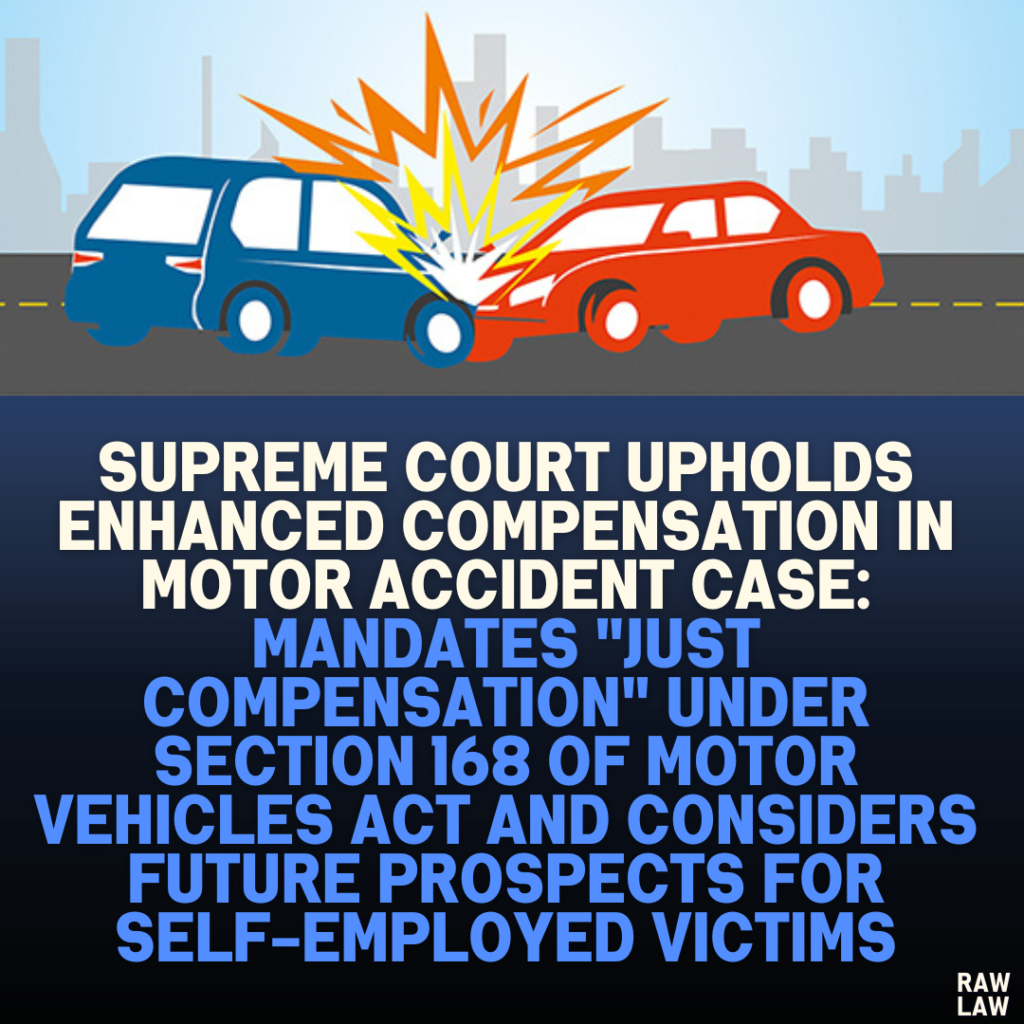Court’s Decision
The Supreme Court dismissed the appeals filed by both the insurance company and the claimant. The Court upheld the High Court’s enhanced compensation awarded to the claimant, emphasizing the statutory mandate under Section 168 of the Motor Vehicles Act to ensure “just compensation.” The Court found no compelling legal errors in the High Court’s calculations that warranted interference.
Facts
- Incident Details: The claimant, a 14-year-old girl, lost her parents and younger brother in a motor vehicle accident in 2007. The accident occurred when a Tata van, driven negligently, collided with a stationary auto-rickshaw in which the deceased were traveling.
- Initial Proceedings:
- The claimant filed three separate petitions before the Motor Accident Claims Tribunal (MACT), seeking compensation for the deaths of her father, mother, and brother.
- The MACT found the driver of the Tata van negligent and awarded compensation of:
- ₹14,78,000 for the father,
- ₹13,33,936 for the mother, and
- ₹2,45,000 for the brother.
- High Court Enhancement:
- For the father, compensation was increased to ₹30,58,000.
- For the mother, compensation was increased to ₹16,34,000.
- For the brother, compensation was enhanced to ₹5,00,000.
Both the insurance company and the claimant challenged the High Court’s decision: the former sought a reduction, and the latter sought further enhancement.
Issues
- Whether the High Court erred by failing to deduct one-third of the deceased’s income towards personal expenses, as required by Sarla Verma guidelines.
- Whether the High Court arbitrarily assessed the income of the deceased without adequate proof.
- Whether compensation under conventional heads exceeded the limits set by Pranay Sethi.
Petitioner’s Arguments (Insurance Company)
- Deduction for Personal Expenses: The High Court incorrectly calculated compensation without deducting one-third of the deceased’s income, contrary to the precedent in Sarla Verma v. Delhi Transport Corporation.
- Income Assessment: The High Court arbitrarily enhanced the income of the deceased without sufficient proof, relying only on xerox copies of Income Tax Returns that were not properly admitted into evidence.
- Excessive Compensation under Conventional Heads: Compensation awarded for loss of consortium, estate, and funeral expenses exceeded the ₹70,000 cap set in Pranay Sethi, without justification.
Respondent’s Arguments (Claimant)
- Future Prospects: Even though the deceased were self-employed, their future earning potential should have been factored into the compensation calculation.
- Fair Income Assessment: The enhancement of income by the High Court was reasonable, considering the self-employment of the deceased and their circumstances.
- Equitable Compensation: The claimant argued that the enhancements made by the High Court were fair and reflective of the claimant’s losses, considering her age and the magnitude of the tragedy.
Analysis of the Law
- Deduction for Personal Expenses: Under Sarla Verma, the standard deduction for personal expenses is:
- One-third for families with 2-3 dependents,
- One-fourth for 4-6 dependents,
- One-fifth for more than six dependents. The Court noted the High Court’s failure to deduct one-third of the income but did not consider this a ground for reduction in the present case.
- Income Assessment and Future Prospects:
- Although the deceased were self-employed, courts can consider future prospects while calculating compensation. The Supreme Court upheld the High Court’s slight enhancement of the deceased’s income, deeming it reasonable under the circumstances.
- Pranay Sethi allows for a 25-40% addition to the income of self-employed individuals under 50 years of age for future prospects.
- Conventional Heads Compensation: Pranay Sethi set a cap of ₹70,000 for conventional heads (loss of estate, loss of consortium, and funeral expenses) with periodic 10% enhancements every three years. However, since the High Court’s judgment predated Pranay Sethi, the Court ruled that this principle could not be retroactively applied to reduce compensation.
Precedent Analysis
- Sarla Verma v. Delhi Transport Corporation (2009): Established standardized deductions for personal expenses based on family size.
- National Insurance Co. v. Pranay Sethi (2017): Set fixed amounts for conventional heads and allowed future prospects to be included for self-employed individuals.
- Kishan Gopal v. Lala (2014): Provided guidelines for compensation in cases involving the death of minors.
- M.A. Murthy v. State of Karnataka (2003): Held that principles laid down by the Court are applicable to all pending cases.
Court’s Reasoning
- Income Assessment: The Court found the High Court’s enhancement of the deceased’s income reasonable, considering their age and occupation. The xerox copies of Income Tax Returns, though inadmissible, provided a fair basis for assessment.
- Future Prospects: The Court agreed that future prospects should be considered for self-employed individuals, as outlined in Pranay Sethi.
- Just Compensation: The Court emphasized the principle of “just compensation” under Section 168 of the Motor Vehicles Act, considering the claimant’s young age and loss of her immediate family.
Conclusion
The Supreme Court dismissed all appeals, affirming the High Court’s enhanced compensation. The Court declined to interfere with the award, ruling that it adequately reflected the principles of equity, fairness, and justice.
Implications
- Just Compensation Emphasized: The judgment reinforces the principle that courts must ensure equitable relief, particularly for vulnerable victims.
- Future Prospects for Self-Employed Individuals: This ruling clarifies that future earning potential can be considered even for self-employed individuals.
- Precedent Adherence: The Court’s reliance on Sarla Verma, Pranay Sethi, and other precedents ensures consistency in motor accident compensation cases.




Pingback: Chhattisgarh High Court Upholds Appellate Court's Remand for Retrial in Fraudulent Caste Record Case: "Order for Retrial Must Only Be Made in Exceptional Cases," Affirms Jurisdiction Under Section 386(a) CrPC - Raw Law